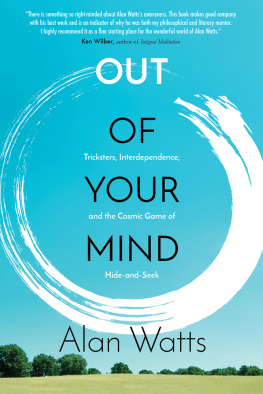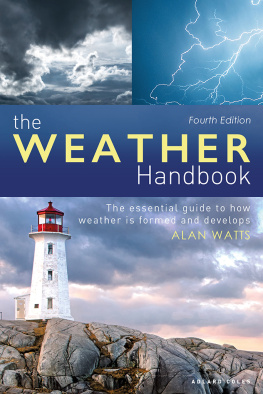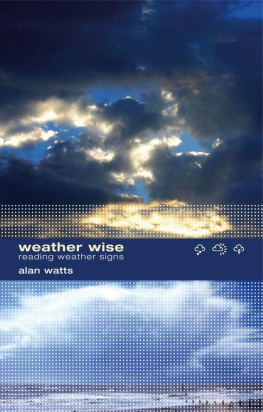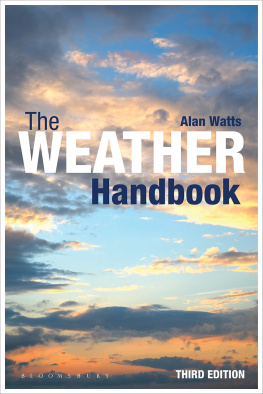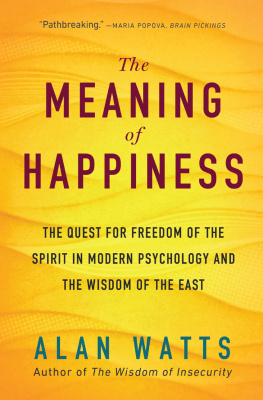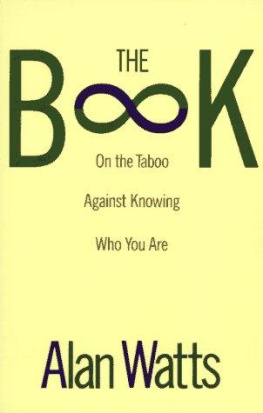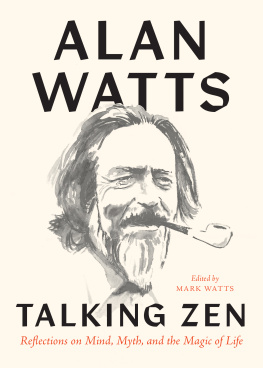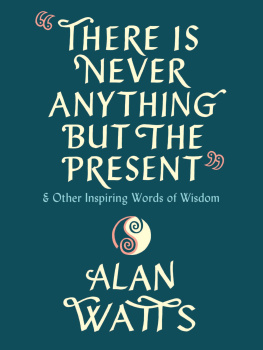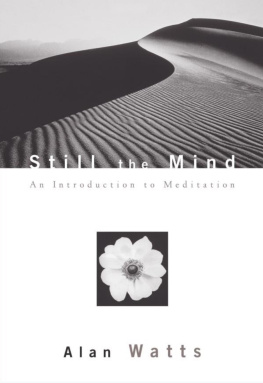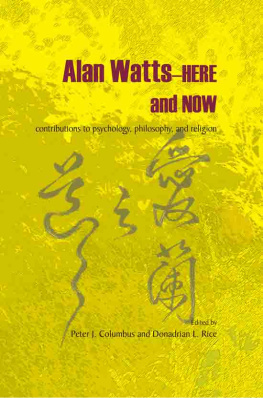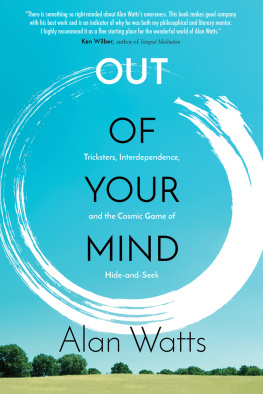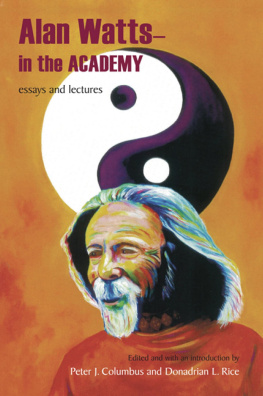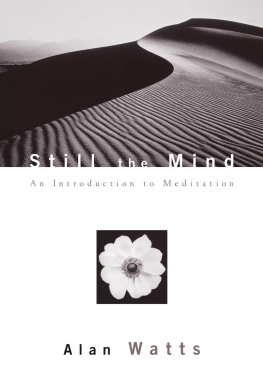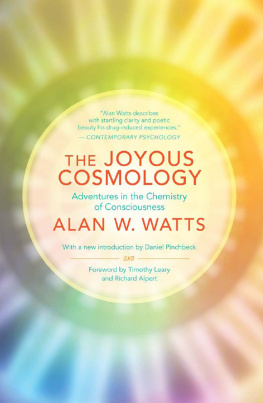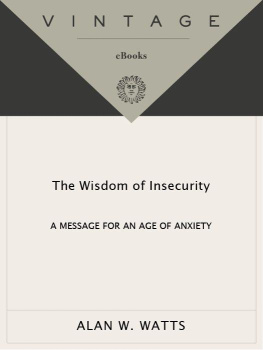
Contents
Acknowledgments
Many thanks to Robert Lee for skillfully crafting these talks into a wonderful book, and to Tami Simon and the entire crew at Sounds True for taking a wonderful collection of lectures and turning them into something truly spectacular over the years in producing and publishing Out of Your Mind.
Preface by Mark Watts
B ack in the midfifties, my father gained a large following for his public radio talks on station KPFA in Berkeley, California, and these talks were soon followed by the bestselling Way of Zen and his groundbreaking Psychotherapy East and West. His approach resonated well with open-minded Bay Area audiences as he examined the wisdoms of Asia through the fresh lenses of Western psychology and the emerging scientific revelations of the postatomic age. In his talks, he often suggested that Buddhism should be thought of as a form of psychotherapy, and was not to be compared with Western religions. Instead, he felt that in essence ecological awareness and mystical experience were expressions of the same form of awakened experience. By the early sixties, his radio talks and landmark books had nudged him out onto the college speaking circuit, and for the next twelve years, he delivered large-hall public lectures and more intimate seminars to groups across the country. Many of these sessions were recorded and collected.
Nearly ten years ago, after reviewing dozens of the seminars my father recorded in the late sixties and early seventies, I selected recordingsthat flowed together beautifullyfrom six historic events to become the Out of Your Mind audio collection. They are all exceptional sessions, including The Nature of Consciousness, Web of Life, Inevitable Ecstasy, The World as Just So, The World as Self, and The World as Emptiness.
Upon its release, Out of Your Mind was an immediate success, and over the years it became one of the most listened-to Alan Watts series of all time, attracting audiences from all over the world. The series of talks began with all-encompassing themes, including core issues of shared perception, comparative cosmology, and humankinds place in the natural world. In these talks, my father demonstrated convincingly that most of the common sense of the Western world is rooted in outdated science and the dominant cultural constructs of the nineteenth century. Always ready to challenge the status quo, he tackled assumptions that many took for granted, demonstrating how out of touch with the contemporary state of knowledge the everyday reality of the Western world had become.
As this body of work developed, he also offered solutions, both psychological and cosmological, and in drawing increasingly from the Buddhist worldview that he explored in these seminars, he offered a fresh and convincing alternative perspective, one of a universe in which we are both inseparable and welcome participants, and at the same time expressions of the entire works. In this ultimately reciprocal worldview, we find not only our place in and of nature, but also the tools with which to share this mind-shifting perspective of life with others.
Even though I understood the power of these talks, I was unprepared for what began to happen as they made their way out and into the world. In addition to being popular with many of Sounds Trues listeners, the collection began to attract a new, younger audience, and several years after its release, quotes and videos began to pop up regularly on social media. Creative video posts based on clips were getting millions of views as well (twenty million at last count), and it is by far the most rewarding aspect of continuing my fathers works to see how these ideas are received in the lives of many, and to watch as they take on new forms and continue to grow.
PART ONE
THE NATURE OF CONSCIOUSNESS
Cosmological Models of the World
I want to start by looking at some of the basic ideas that underlie our common sense in the Westour fundamental notions about what life is all about. There are historical origins for these ideas, and their influence is a lot stronger than most people realize. Im referring to our essential beliefs about the worldbeliefs that are built into our systems of logic and the very nature of the language we use.
Ill use the word myth to refer to these ideas. Not to denote something untrue, but to call to mind something quite powerful. A myth in this sense is an image we use to make sense of the world, and at present, we live under the influence of two extremely powerful images, both of which are entirely inadequate in the present state of scientific knowledge. One of our most important challenges today is to replace these myths with an adequate, satisfying, and sensible image of the world that accords with our actual experience of it.
So, the two fundamental images of the world that weve been operating under for more than two thousand years are essentially models of the universe: the ceramic model and the fully automatic model. Lets look at the first of these, the ceramic model.
The ceramic model of the universe originates from the book of Genesis, from which Judaism, Christianity, and Islam all derive their basic picture of the world. And the image of the world that comes from the book of Genesis is that the world is an artifact made by the Creatorjust as a potter forms pots out of clay, or a carpenter fashions tables and chairs from wood. Dont forget that Jesus, the Son of God, is also the son of a carpenter. So, in this way, the image of God we have is one of a potter, carpenter, technician, or architect who creates the universe in accordance with his plan.
Essential to this first model of the universe is the notion that the world consists of stuffprimordial matter or substance. And just as the potter takes clay and imposes his will upon it, so does the Creator craft the universe out of this fundamental stuff. He takes it and makes it into whatever he wants. And so in the book of Genesis, the Lord God makes Adam out of dusthe fashions a clay figurine, breathes into it, and it becomes alive. The clay becomes informed. See, by itself, the clay is formless and comes with no intelligence, so it requires an external intelligencean external energyto bring it to life and put some sense in it.
This is how weve inherited the concept of ourselves as artifacts, as things that were made. In our culture, children ask their parents, How was I made? or Who made me? But these arent questions asked by Chinese or Indian (specifically, Hindu) children. Now, a Chinese child might ask her mother, How did I grow? But growing and making are entirely different procedures. You see, when you make something, you put it togetheryou arrange its parts, you work from the outside to the in. Again, thats how a potter works on clay, or a sculptor works on stone. However, when you watch something grow, it happens in the opposite directionthat is, from the inside to the out. Growth means that something expands, burgeons, blossoms, and happens all over itself at once. The original, simple form of a living cell in the womb will progressively complicate itself.
Thats what the growing process looks like, as opposed to the making process. Note that in this model, theres a fundamental difference between the maker and the made thing, between the Creator and his creature.
Where did this idea originate? Basically, the ceramic model of the universe came out of cultures with monarchical forms of government. And so, for them, the maker of the universe was also conceived as the king of the universeKing of kings, Lord of lords, only Ruler of princes...Im quoting from the Book of Common Prayer here. People who orient themselves to the universe in this way relate to basic reality as a subject relates to a king, and so theyre on very humble terms with whatever it is that runs the whole show. I find it odd that here in the United States, citizens of a democracy still hold to such a monarchical theory of the universe.
Next page
